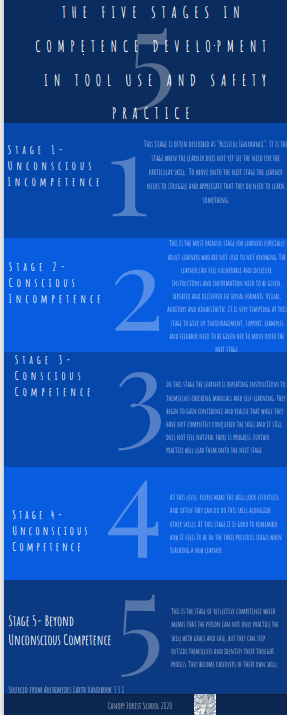"The Four Stages for Learning Any New Skill"- Dr Thomas Gordon
- ejejones

- Nov 23, 2020
- 2 min read
Updated: Apr 13, 2022
The steps in developing competence in the use of tools and other skills is thought to involve 5 stages (the fifth one is controversial as it is "reflective competence" and is often not shown in models). The developing competence cycle is sequential in that each step needs to be travelled through until you are ready to make on the next stage. The skill of the Forest School trainer is to make the transition from one stage to the next as fluid and as painless as possible.
During the Tool Talk section of this course I have found myself going through these stages and have felt vulnerable and insecure about my own knowledge. These feelings are something that I will need to tap into when teaching tool use to others in the future.
Dr Thomas Gordon developed these four stages and below you will see a model of it sourced from https://www.evolutionculture.co.uk/4-stages-of-competence/

Stage 1-Unconscious Incompetence-blissful ignorance-not being able to see the need for the particular skill. Learners need to be in a position where they struggle and need to appreciate that they need to learn something.
Stage 2-Conscious Incompetence-This is the most painful stage for learners, particularly adult learners who are used to having a certain level of competence in other spheres of life. It's a sobering experience to realise that you are not very good at this new skill. Instructions and information need to be given, repeated and delivered in several formats; visual, auditory and kinaesthetic. It is tempting at this stage to give up. Encouragement and support are needed at this stage and practical examples of people who have successfully mastered the skill.
Stage 3- Conscious Competence- In this stage instructions are followed with painful accuracy. Repeating instructions to yourself, checking manuals as the learner gradually gains confidence and realise that while the skill feels unnatural and forced, there is progress. The skill can be practiced but only with a full conscious effort and full attention. More practice is needed to move on.
Stage 4-Unconscious Competence-When people are at this level, the skill looks effortless. The unconsciously competent person can often do other things along with the skill. At this stage trainers may need to become learners again to understand the feelings of others.
Stage 5- Beyond Unconscious Competence- This competence means that not only can the person practice the skill with grace and ease but they can also step outside themselves to see what they have done and identify the steps and their underlying thought process. They become observers of their own skill.
Sourced from: Archimedes Earth Handbook 3.3.1 Stages in Competence Development in Tool Use and Safety Practices.




Comments